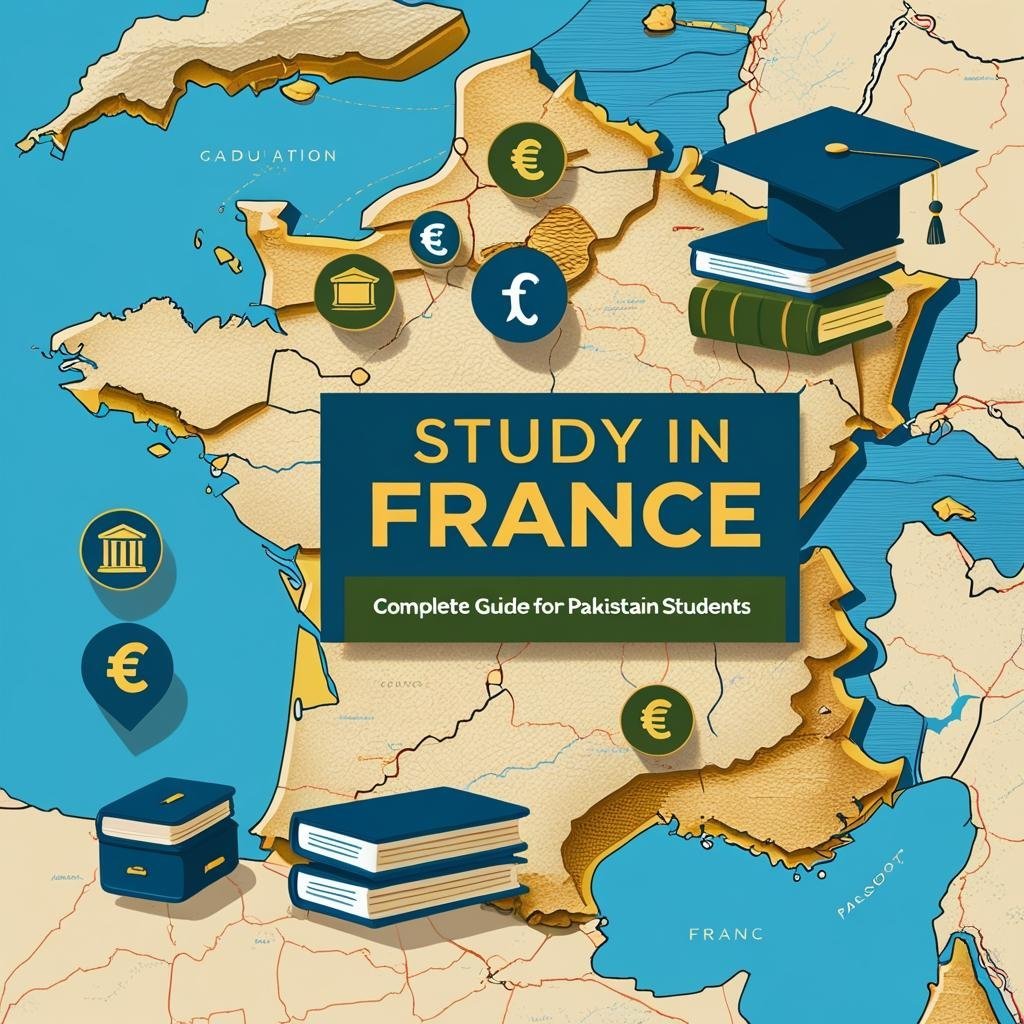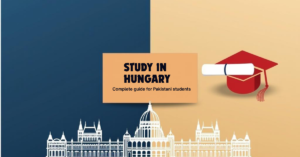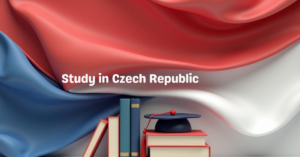Study in France 2025–2026: Complete Guide for Pakistani Students
Study in France Complete Guide: Get detailed info on admission requirements, language tests, required documents, and visa process. Learn about top universities in France, tuition fees, and how to secure full and partial scholarships like Eiffel and France Excellence. Understand living costs, affordable cities, part-time work options, and post-study job opportunities for Pakistani students.

Admission Process to Study in France for Pakistani Students (Bachelor, Master, PhD)
General Admission Overview for Pakistani Students
Études en France (EEF) Portal
Mandatory online portal managed by Campus France Pakistan.
Submit academic documents, Statement of Purpose (SOP), and other materials.
Campus France forwards your application to selected universities.
Some universities may accept direct applications; always check university guidelines.
Bachelor’s Admission Requirements & Process
Eligibility Criteria for Bachelor’s Programs
Completed 12 years of schooling (Intermediate: FA/FSc or A-Levels).
Minimum recommended marks: 60–65% for general admission; 70%+ for competitive programs.
French language proficiency at DELF/TCF B2 level is required for most programs.
Some English-taught programs available but limited.
O-Levels alone do not fulfill eligibility.
Application Procedure for Bachelor’s
Apply via Demande d’Admission Préalable (DAP) through Campus France Pakistan portal.
Select up to 3 universities/programs for the first year.
Application period: November to mid-January (usually January 15).
Possible interview by Campus France in January or February.
Required Documents for Bachelor’s Application
Matric and Intermediate/A-Level transcripts, attested by IBCC & HEC.
Passport copy.
Statement of Purpose (1–2 pages; preferably in French).
Recommendation letter (optional but recommended).
Language proficiency certificate: DELF/TCF B2 (French) or IELTS 6.0+ (English).
Campus France processing fee (~$150–200 USD).
After Submission
University responses arrive by April or May.
Accept offer by mid-May deadline or risk losing admission.
Direct Admission (L2/L3)
Apply directly to universities if transferring to 2nd or 3rd year.
Deadlines around May–June.
Submit university transcripts, course details, and language certificates.
Master’s Admission Requirements & Process
Eligibility Criteria for Master’s Programs
Relevant Bachelor’s degree with 16 years of education (4-year BS/BEng or equivalent).
Minimum CGPA of ~2.5/4.0 (60–65%); competitive courses may require 3.0+.
Many Master’s courses offered fully in English.
Grandes écoles may require additional tests such as GMAT/GRE.
Application Procedure for Master’s
Apply mainly through the Études en France portal.
Deadlines vary: December to March for Fall intake; Grandes écoles deadlines earlier (Jan–Feb).
Early application improves chances.
Required Documents for Master’s Application
Degree certificates and transcripts (HEC attested and translated if needed).
Curriculum Vitae (CV) of 1–2 pages.
Tailored Statement of Purpose (1 page).
Two Letters of Recommendation on official letterhead.
Language proof: IELTS 6.5+ (English programs) or DELF B2 (French).
GRE/GMAT if required.
Portfolio or research proposal if applicable.
Application fees vary (€0–€150 depending on institution).
After Submission
Admission results typically announced March to June.
Possible Skype/Zoom interviews.
Confirm admission and pay deposit by deadline.
Official admission letter provided for visa application.
PhD Admission Requirements & Process
Eligibility Criteria for PhD Programs
Master’s degree (M2) with 18 years of education generally required.
Exceptional Bachelor’s holders with strong research may be considered.
Secure a supervisor and research topic before applying.
Funding mainly via doctoral contracts (€1,400–1,800/month salary), research grants, or HEC scholarships.
HEC scholars must return to Pakistan post-PhD.
Application Procedure for PhD
Submit research proposal, CV, Master’s transcripts, thesis (if available), and recommendation letters.
Language proof (English or French) may be required depending on discipline.
Apply directly to doctoral schools or contact professors.
Enrollment granted upon approval by doctoral school.
Timeline and Visa for PhD
PhD calls open mostly March to May.
Program start date usually October.
Funded PhD candidates should apply for Passeport Talent – Chercheur visa.
Top Scholarships for Pakistani Students to Study in France
Note: Scholarship deadlines and details may vary yearly. For the latest updates, deadlines, and application procedures, always check Pak Euro Links and official scholarship websites.
Eiffel Excellence Scholarship (French Government)
Level: Master’s (up to 25 years old) & PhD (up to 30 years old)
Fields: Science, Engineering, Economics, Law, Political Science
Deadline: Usually January — verify exact date on Pak Euro Links
Benefits:
Monthly stipend: €1,181 (Master’s), €1,700–1,800 (PhD)
Round-trip airfare, insurance, housing, cultural activities
Tuition fee waiver (usually by universities)
How to Apply: Apply to French universities which will nominate candidates for this scholarship.
France Excellence Scholarship (French Embassy in Pakistan)
Level: Master’s
Focus Areas: Climate, Environment, Agriculture, Energy
Deadline: Usually January — check Pak Euro Links for updates
Eligibility: Pakistani nationals under 28 with 16 years of education
Benefits:
Full tuition waiver
Monthly stipend of €700–800
Airfare, visa fee waiver, and health insurance included
Application Portal: Campus France Pakistan
Erasmus Mundus Joint Master’s Scholarships (EU Funded)
Level: Master’s (2-year joint degrees across EU)
Eligibility: Open to non-EU nationals, including Pakistani students
Deadline: December–January (varies by program) — check Pak Euro Links
Fields: Engineering, Economics, Photonics, and more
Benefits:
Full tuition coverage
Monthly stipend €1,000+
Travel allowance and insurance
Apply Via: Specific Erasmus Mundus program websites (search via EMJMD Catalogue)
Emile Boutmy Scholarship (Sciences Po)
Level: Bachelor’s and Master’s
Deadline: December (Masters), February (Bachelor) — confirm on Pak Euro Links
Eligibility: Non-EU students admitted to Sciences Po
Benefits:
Bachelor’s: €3,600–13,000/year
Master’s: Around €10,000–13,000/year plus possible €5,000 living stipend
Eligible for Pakistan Merit Scholarship in addition
How to Apply: Via Sciences Po admission process
Paris-Saclay International Master’s Scholarship (IDEX)
Level: Master’s
Deadline: Spring (after admission) — check Pak Euro Links
Eligibility: Top international admits (non-EU students)
Benefits:
€10,000/year scholarship
Up to €1,000 for travel and visa expenses
Tuition fees are often already reduced
Offered by: University of Paris-Saclay
Ampère Excellence Scholarship (ENS de Lyon)
Level: Master’s
Fields: Sciences, Arts, Humanities
Deadline: January — verify on Pak Euro Links
Eligibility: International students with strong academic record
Benefits:
€1,000/month stipend
Nearly free tuition at ENS Lyon
Erasmus+ Master Degree Loans (Not Scholarship)
Type: Low-interest loans for Erasmus+ eligible Master’s students
Deadline: Varies by lender; check Pak Euro Links
Eligibility: Admitted to Erasmus+ Master’s programs in France
Benefits:
Up to €12,000 for 1-year programs, €18,000 for 2-year programs
No collateral; repayment starts after graduation
MIEM / SMARTS-UP Scholarships (Université Paris Cité)
Level: Master’s
Deadline: January–February — check Pak Euro Links
Eligibility: Non-EU international students
Benefits:
€8,000–10,000/year
Fields: Science, Health, Social Sciences
Grenoble INP Foundation Scholarships
Level: Master’s (Engineering/Science)
Deadline: Early March — verify on Pak Euro Links
Eligibility: Non-EU students admitted to Grenoble INP
Benefits:
€5,000 per semester (€10,000 per year)
Make Our Planet Great Again (MOPGA) Scholarships
Level: Master (research), PhD, Post-doc
Focus: Climate Change, Sustainability, Environmental Sciences
Deadline: Varies yearly — check Pak Euro Links for announcements
Benefits:
Around €1,500/month stipend
Full funding for research stays in France
Top 10 Universities in France (2025–26) for Pakistani Students
France offers globally recognized education with affordable tuition fees and a wide range of programs suitable for international students. Below are the top 10 universities recommended for Pakistani and other international students seeking quality education in France.
1. Université PSL (Paris Sciences & Lettres) – Paris
Website: psl.eu
Fields: Physics, Mathematics, Engineering, Economics, Philosophy
Features: Combines 25 elite institutions including École Normale Supérieure and Dauphine
Tuition: €2,850 (Bachelor), €3,879 (Master) for non-EU; many pay EU rates (~€170–€243)
Language: Most undergraduate courses in French; many Master’s and some Bachelor’s programs offered in English
Language Requirements: DELF B2 (French) or IELTS 6.0 (English)
2. Université Paris-Saclay – Paris Region
Website: universite-paris-saclay.fr
Strong in Physics, Computer Science, Engineering, Life Sciences, Medicine
Formed by merging top research institutes and grandes écoles
Tuition: €2,770 (Bachelor), €3,770 (Master); non-EU students often pay EU fees (~€170–€243)
Language: Many Master’s in English; most Bachelor’s in French
Language Requirements: B2 French or IELTS 6.0+ for English tracks
3. Institut Polytechnique de Paris (IP Paris) – Palaiseau
Website: ip-paris.fr
Known for Engineering, Mathematics, AI, Business, Physics
Includes 5 grandes écoles such as École Polytechnique and Télécom Paris
Tuition: €12,000–€19,000/year for MSc and Ingénieur programs; scholarships available
Language: Many programs in English; some bilingual; French required for certain tracks
Language Requirements: IELTS 6.5 (English) or B2 (French)
4. Sorbonne University – Paris
Website: sorbonne-universite.fr
Programs in Medicine, Biology, Chemistry, Humanities, Mathematics
Faculties: Science, Humanities, Medicine
Tuition: €2,800 (Bachelor), €3,800 (Master); some exemptions available
Language: Undergraduate mostly French; some Master’s programs in English
Language Requirements: DELF B2 (French), IELTS 6.5 (English)
5. Université Paris Cité – Paris
Website: u-paris.fr
Offers Medicine, Biology, Physics, Linguistics, Social Sciences
Formed from Paris Diderot & Descartes Universities
Tuition: €2,850 (Bachelor), €3,879 (Master); often reduced by waivers
Language: Mostly French; select Bachelor’s and Master’s in English
Language Requirements: DELF B2 or IELTS 6.0
6. Université Paris 1 Panthéon-Sorbonne – Paris
Website: pantheonsorbonne.fr
Specializes in Economics, Law, Political Science, History, Philosophy
Top French university for Humanities and Social Sciences
Tuition: Around €2,800/year for non-EU students
Language: Primarily French; some Master’s in English
Language Requirements: B2 French or IELTS 6.5 for English programs
7. École Normale Supérieure de Lyon – Lyon
Website: ens-lyon.fr
Known for Mathematics, Physics, Literature, Social Sciences
Focus on training researchers and professors; highly selective
Tuition: €0–€500/year; scholarships with stipends and fee waivers available
Language: Mostly French for undergraduates; bilingual/English options for Master’s
Language Requirements: French B2 or English proficiency depending on program
8. Université Grenoble Alpes – Grenoble
Website: univ-grenoble-alpes.fr
Strong in Computer Science, Engineering, Physics, Earth Sciences, Business
Located in tech hub for microelectronics and nanotech
Tuition: ~€2,800 for non-EU; scholarships like Grenoble INP Foundation available
Language: Many STEM Master’s in English; undergraduate mostly in French
Language Requirements: IELTS 6.0 or French B2
9. Université de Montpellier – Montpellier
Website: umontpellier.fr
Offers Medicine, Pharmacy, Ecology, Agronomy, Computer Science
One of the world’s oldest universities with modern research strength
Tuition: Standard public rates; some exemptions for non-EU students
Language: Mostly French; select Master’s partially in English
Language Requirements: French required for most programs
10. Aix-Marseille University – Marseille & Aix-en-Provence
Website: univ-amu.fr
Largest French university with Health, Marine Science, Math, Law programs
Includes Sciences Po Aix and multiple faculties
Tuition: €2,800 (Bachelor), €3,800 (Master); waivers possible
Language: Primarily French; some Master’s in English (e.g., Neuroscience)
Language Requirements: French strongly recommended; IELTS for English tracks
Part-Time Job Options for Students in France
Work Permissions & Allowed Hours
International students holding a VLS-TS student visa can work up to 964 hours per year (~19.5-20 hours/week) during term time. Full-time work (40 hours/week) is allowed during university holidays within this annual limit.
PhD students on a chercheur visa usually have permission to work full-time.
Common Part-Time Jobs for International Students
On-Campus Jobs: Library assistant, student tutor, campus guide, student office helper.
Hospitality & Food Service: Waiter/waitress, kitchen assistant, fast food chains.
Retail: Stocking shelves, cashier in shops or supermarkets.
Tourism & Events: Museum ticket staff, hotel receptionist, Disneyland Paris staff.
Call Centers/Customer Service: Night shifts requiring English and other languages.
Teaching & Tutoring: English or subject tutoring (€15-20/hour), TAPIF assistant (€785/month stipend).
Babysitting/Au Pair: English-speaking babysitters earn ~€10/hour.
Delivery & Ride Sharing: Flexible jobs via UberEats, Deliveroo, or Uber (with license).
Internships: Usually paid (~€600+/month), relevant to studies and often during later degree years.
Wages & Earnings
Minimum wage (SMIC) in 2025: ~€11.5 gross/hour (€8-9 net).
Typical part-time earnings: Around €600 net/month for 15 hours/week.
Tutoring and babysitting can earn more.
Working full allowed hours (964 hours/year) can yield ~€10,600 gross (€8,000 net).
How to Find Part-Time Jobs
University career services and online job portals (Indeed.fr, Le Bon Coin, StudentJob.fr, Staffme).
Local Facebook groups and community boards.
Drop CVs in person at cafes, shops, and restaurants.
Networking with Pakistani student associations and local communities.
Learning basic French (A2/B1) significantly improves job prospects.
Balancing Work and Study
10-15 hours/week is manageable with good time management.
Work more during holidays and less during exams.
Employers generally accommodate exam schedules.
Academic success should always be the priority.
Ease of Finding Jobs for Pakistani Students
Reasonable opportunities in large cities like Paris, especially in hospitality and delivery.
Fewer jobs and more French required in smaller cities.
English tutoring and babysitting are popular options.
Persistence and networking are essential for success.
Post-Study Work Opportunities & Path to Residency in France
APS (Autorisation Provisoire de Séjour) – Post-Study Work Visa
Allows recent graduates (Master’s or Licence professionnelle) to stay in France for 12 months, renewable once (total 24 months).
Purpose: To search for jobs or start a business.
No hourly work limit during APS.
Apply at prefecture near graduation with degree certificate and proof of financial resources.
APS holders can transition to work permits if they secure qualifying employment.
Transition to Full Work Visa
Salarié Permit: Standard work visa requiring a job contract and minimum salary.
Talent Passport: For skilled workers, entrepreneurs, researchers, startups. Includes the EU Blue Card if salary exceeds €53,836/year.
Entrepreneur Talent Passport: For business founders and startup founders.
Permanent Residency (PR) & Citizenship
PR usually granted after 5 years of continuous legal residence.
Student years may count partially or fully depending on status.
Requirements include stable income, French language proficiency (A2/B1), and social integration.
Citizenship eligibility after 5 years with B1 French and proof of integration.
Fields Beneficial for Long-Term Settlement
IT & Software Development
Select Engineering disciplines
Research & Academia (PhD graduates)
Business & Finance (with French language skills)
Hospitality & Tourism (multilingual skills helpful)
Entrepreneurial & Startup sectors (French Tech Visa)
Employers Hiring International Graduates
Multinationals like Airbus, Schlumberger, L’Oréal
IT startups and incubators in Paris
Financial & consulting firms (PwC, EY, Deloitte)
Hospitality chains (AccorHotels, Disneyland Paris)
Research labs and universities (CNRS, IBM France)
Study in France: Visa Chances, Popular Courses & Living Costs for Pakistani Students
🎓 Visa Chances for Pakistani Students
Pakistani students generally have a good chance of obtaining a French student visa if they submit a complete, well-prepared application. France recently issued nearly 60,000 student visas globally, with increasing interest from South Asia.
To maximize your chances:
Show clear financial ability
Demonstrate genuine intent to study seriously
Apply early to meet deadlines
Bonne chance!
📚 Most Popular Courses & Fields for International Students (Including Pakistanis)
1. Business & Management
Top choice: 42,500+ international students in business schools
Degrees: MBA, Master in Management (MiM), Finance, Marketing, Luxury Brand Management
Top schools: INSEAD, HEC Paris, ESSEC, EDHEC, public IAE universities
Careers: Multinationals, consulting, entrepreneurship
Starting salary: €35,000–€50,000+
Strong sectors: Luxury brands (LVMH), banking, supply chain
2. Engineering & Technology
26,000+ international engineering students
Fields: Mechanical, Aerospace (Airbus, Dassault), Electrical, Civil, AI, Industrial Automation
Popular with Pakistani students: Mechanical, Automotive, Aerospace, Telecom, Energy Engineering
Career scope: High demand; APS post-study work visa available
Starting salary: ~€32,000 net/year
3. Computer Science & IT
Growing demand worldwide and in France
Fields: Data Science, AI, Cybersecurity, Software Engineering, Cloud Computing
Schools: EPITA, EURECOM, Polytechnique, Paris-Saclay
Career: Strong job market with shortages of IT professionals
Salary: €35,000–45,000 starting
Language: English sufficient; French is a plus
4. Natural & Physical Sciences
Research-focused: Physics, Mathematics, Chemistry, Biology, Biotechnology
Schools: Paris-Saclay, Sorbonne
Careers: Academia, R&D, pharmaceutical, environment
Salary: €30,000–40,000 depending on role
5. Medicine & Health Sciences
Mostly French-taught; competitive entrance exams
Postgraduate options: Public Health, Pharmacy, Biomedical Engineering
Careers: Pharma, research, NGOs; clinical practice requires fluent French
Salary: Pharmacists ~€40,000; public health ~€30,000–35,000
6. Law, Political Science & International Relations
Schools: Sciences Po, Paris 1 Panthéon-Sorbonne
Popular degree: LL.M. in international law/arbitration
Careers: NGOs, international organizations, government
Salary varies; knowledge of French and UN languages advantageous
7. Art, Design & Luxury Goods
Paris: Global fashion & luxury hub
Courses: Fashion, Culinary Arts, Luxury Brand Management, Architecture
Careers: Fashion houses, Michelin-star restaurants, architecture firms
Starting salary: ~€30,000
8. Hospitality & Tourism
Schools: Vatel, Ferrandi, Nice, Côte d’Azur universities
Careers: Hotels, airlines, events; internships common
Salary: €1,500–2,000/month entry-level
9. Agriculture, Agri-Business & Food Science
Strong French sector; top schools like Montpellier SupAgro
Focus: Crop science, food safety, wine studies
Careers: Food companies, international food security organizations
💼 Career Scope & Salary Insights
Engineering & IT: High demand, starting salaries €32,000–45,000
Business: €30,000–50,000 depending on program
Sciences & Healthcare: €30,000–40,000 starting
Luxury & Art: Competitive, rewarding fields
France minimum wage: ~€1,700/month gross
🏡 Living Expenses in France (Monthly Estimates)
| Expense | Paris (High) | Big Cities (Lyon, Marseille) | Medium Cities (Nantes, Lille) | Small Towns (Limoges) |
|---|---|---|---|---|
| Rent (shared room) | €500–€800 | €350–€500 | €300–€450 | €200–€250 |
| Food (groceries) | €150–€200 | €150–€200 | €150–€200 | €150 |
| Transport | €30–€40 | €25–€35 | €20–€30 | €20 |
| Utilities | €40–€70 | €40–€70 | €30–€50 | €30 |
| Mobile & Internet | €10–€20 | €10–€20 | €10–€20 | €10 |
| Health Insurance | Free* | Free* | Free* | Free* |
| Miscellaneous | €50–€100 | €50–€100 | €40–€80 | €30–€50 |
| Total approx. | €900–1,300+ | €700–1,000 | €600–800 | €500–700 |
*Health insurance free after CVEC payment.
💡 Budget Tips for Pakistani Students
Apply early for CROUS university housing for cheaper rent
Share accommodation to split costs
Use CAF housing subsidies (~30% rent refund after a few months)
Cook at home with affordable groceries and halal meat from local butchers
Eat at university restaurants (RU) for balanced meals (~€3.30)
Use student discounts on transport, cultural sites, cinemas
Buy second-hand clothes and appliances from charity shops
Open a student bank account to avoid fees
Use budget mobile plans (~€10/month) and free communication apps
Utilize public libraries and fresh markets for free resources and cheap food
🚌 Transport & Travel
Student public transport passes cost €25–40/month depending on city
Paris Imagine’R pass: ~€35/month for unlimited zones
Train discounts with Carte Jeune: 25–50% off
Cycling and ride-sharing popular and cost-effective
🏥 Health Insurance & Medical Services
French student health insurance is mandatory and free after registration
Campus life fee (CVEC) around €100/year
Optional complementary insurance (mutuelle) costs €20–40/month
Health care mostly reimbursed; doctor visits ~€25
🌟 Final Advice for Pakistani Students
Budget at least €615/month as visa requirement; actual living costs vary by city and lifestyle
Paris is expensive; consider smaller cities for affordable living
Use internships to gain experience and improve employability
Choose courses aligned with career goals and job market demand in France or Pakistan
Prepare a strong, honest visa application to avoid delays
Path to Settlement in France for Pakistani Students and Professionals
1. Pathway to Long-Term Residence and Citizenship
Work Experience Route
After 2+ years on a valid work permit, you can renew your permit or apply for the 10-year residence card if you maintain stable income and integrate well.
Student to Resident Route
After 5 years of combined student and work residence, you become eligible to apply for the 10-year residence card.
Employer Sponsorship
If you hold a Talent Passport visa or are valuable to your employer, they may sponsor you directly for a Carte de résident (long-term residence).
Benefits of Permanent Residency (PR)
PR or citizenship grants EU-wide mobility and access to more job opportunities.
Fields with Strong Pakistani Presence
IT professionals in Paris (e.g., Ubisoft, Criteo)
Engineering PhDs in high-tech/R&D firms (e.g., EDF nuclear engineering)
Academia (Chemistry, Physics research)
Business graduates joining multinationals or relocating within EU/Middle East
Family Reunification
Immediate family members can join on dependent visas.
Some Talent Passport categories allow simultaneous family visa issuance.
Citizenship
France permits dual citizenship, allowing you to retain Pakistani nationality.
2. Documents Checklist for Admission, Visa, and Interviews
A. University Admission Documents
Secondary certificates (SSC, HSSC, O/A Levels) with transcripts
University transcripts & degree certificates (HEC attested recommended)
Passport copy
CV/Resume (academic format preferred)
Statement of Purpose (SOP), program-specific
2 Letters of Recommendation (academic and professional if possible)
Language test scores (IELTS/TOEFL for English, DELF/TCF for French)
Medium of Instruction letter (sometimes accepted)
GRE/GMAT (if required)
Portfolio or research proposal (if applicable)
Passport-size photo
Financial plan (if requested)
Translations & notarizations for Urdu documents
Birth certificate translation for enrollment
B. Student Visa Application Documents
Visa application form + 2 passport photos
Original passport + copies
Campus France confirmation (NOC/ID)
Official admission letter
Proof of funds (~€7,390/year minimum): bank statements, sponsor affidavit, loan letters, scholarship awards
Proof of accommodation: dorm reservation, rental contract, host attestation + ID + utility bill, hotel booking if temporary
Flight reservation (tentative)
Schengen travel insurance (min 3 months, €30,000 coverage)
Academic degrees & transcripts copies
Language proof (IELTS/DELF) if applicable
CNIC copies (student & sponsor)
Birth certificate (English)
Police clearance certificate (recommended)
Marriage certificate (if spouse accompanying)
Sponsor letter + proof of income
Motivation letter (optional)
Photocopies of all documents
C. Campus France / Embassy Interview Documents
Originals & copies of academic documents
Language certificates (IELTS/DELF)
Admission letters
Proof of funds summary
Passport
Prepare to explain study plan, motivation, and language skills
3. Financial Proof Preparation Tips
Show at least €10,000 for safety (above minimum €7,390)
Use official bank statements printed on bank letterhead with stamp/signature
Avoid sudden large deposits; show consistent fund history
Include loan letters and salary slips for credibility
Mention property or gold assets but do not substitute liquid funds
Extra funds help with deposits, emergencies, and initial stay
4. Translation & Notarization Guidance
Notarization usually not required for original degrees or bank statements
Certified translation needed for Urdu documents (birth, marriage certificates)
Use authorized translators (e.g., Alliance Française recommended)
English documents accepted for admission and visa, but French translation may be required later
5. Language Requirements (English & French)
English-Taught Programs
IELTS scores generally required:
Bachelor’s: ~6.0 overall
Master’s: 6.5 overall (some accept 6.0)
PhD: Usually 6.5 or equivalent TOEFL
Some universities accept Medium of Instruction letters but IELTS safer
TOEFL and Duolingo English Test sometimes accepted
Visa officers typically require proof of English proficiency
French-Taught Programs
DELF B2 or TCF scores usually required
Some programs accept B1 conditionally with improvement promise
PhDs in French humanities often require C1 level
Visa officers expect DELF/TCF proof or evidence of French study
Programs Without IELTS
Some accept MOI letter or internal tests
Foundation or French prep year possible before starting
Visa officers may still require IELTS for assurance
6. Language Preparation Resources
Alliance Française Pakistan (Islamabad, Lahore, Karachi) for DELF/DALF courses and exams
NUML Islamabad and private institutes for French
Online platforms: Coursera, TV5Monde, Duolingo
IELTS prep: British Council, AEO, local academies
French language classes often offered post-arrival at universities
Career Growth by Field in France for Pakistani Graduates
1. Information Technology (Software, Data Science, AI)
Demand: Very high due to France’s booming tech sector and initiatives like La French Tech.
Non-EU Friendly: Yes, many IT jobs require English; coding skills are universal.
Starting Salary: €35k–€45k gross/year for software engineers; data scientists €40k–€50k; senior/PhD roles €60k+.
Growth: Rapid, especially in Paris, Toulouse, Sophia Antipolis tech hubs.
Job Resources: Indeed, LinkedIn, Welcome to the Jungle; tech meetups.
Example Roles: Software developer, AI engineer, DevOps, cybersecurity analyst.
2. Engineering (Mechanical, Electrical, Civil, etc.)
Demand: Strong, particularly in aerospace, automotive, energy, and construction.
Non-EU Friendly: Possible with internships; French often needed for local roles.
Starting Salary: €30k–€38k gross/year; specialized jobs start higher.
Growth: Stable, increasing focus on green energy and sustainable infrastructure.
Job Resources: Company websites, APEC.fr, Cadremploi, alumni networks.
Example Sectors: Airbus aerospace, Renault automotive, Vinci construction.
3. Business and Finance
Demand: Moderate; steady for finance roles like accounting and risk management.
Non-EU Friendly: Possible in fintech, quantitative finance, international teams; French often required in marketing and management.
Starting Salary: Finance analysts €35k–€42k; Big 4 auditors €32k–€37k; consultants €45k–€50k.
Growth: Clear career progression; language skills critical.
Job Resources: LinkedIn, Glassdoor, APEC.fr, business school fairs.
4. Healthcare & Life Sciences
Demand: High but strict licensing for foreign doctors and nurses.
Non-EU Friendly: Research and pharma R&D roles more accessible; French essential for regulatory jobs.
Starting Salary: Research scientists €35k–€45k; postdocs €28k–€33k; doctors higher but hard pathway.
Growth: Expanding pharma and biotech sectors.
Job Resources: Academic networks, biotech job boards (e.g., leem).
5. Hospitality & Tourism Management
Demand: Strong due to France’s tourism industry; operational roles easier to secure.
Non-EU Friendly: Yes, especially with multilingual skills.
Starting Salary: Entry-level €25k–€30k; department managers €35k–€40k.
Growth: Good mobility in global hotel chains.
Job Resources: Internships, hotel career sites (Accor, Marriott), Disneyland Paris jobs.
6. Creative Industries (Art, Design, Media)
Demand: Niche and highly competitive.
Non-EU Friendly: Possible with strong portfolios; language skills help.
Starting Salary: Junior roles €24k–€30k; many start with unpaid/low-paid internships.
Growth: Unpredictable; many switch to marketing/communications.
Job Resources: Industry networking, competitions, specialized recruiters.
General Advice for Non-EU Graduates Seeking Careers in France
Language: Aim for at least B2 level French to improve job prospects.
Internships: Crucial to gain local experience and build networks.
Networking: Attend career fairs, alumni events, use LinkedIn actively.
Skill Development: Obtain certifications and technical skills relevant to your field.
Job Portals: Use Indeed.fr, LinkedIn, APEC.fr, Pole Emploi, Glassdoor.fr.
Work Permit: APS post-study work permit simplifies hiring for employers.
Persistence: Job search may take time; stay flexible and keep improving.
Plan B: Consider other EU countries or PhD studies if needed.
Foundation and Diploma Pathways in France for International Students
1. Foundation Programs (Préparation / Foundation Year)
Helps with French language and academic preparation.
Usually 1 year with language + introductory courses.
Ideal for students with limited French or non-aligned high school backgrounds.
Examples: Sorbonne’s Cours de Civilisation Française (CCFS), Sciences Po certificate.
2. Grandes Écoles Preparatory Classes (CPGE)
Intensive 2-year courses mainly for fluent French students.
Not typical for international students unless highly proficient in French.
3. Brevet de Technicien Supérieur (BTS)
2-year vocational diploma focused on practical skills.
Fields include IT, hotel management, accounting.
Mostly taught in French; entry requires HSSC or equivalent.
Can lead to direct employment or Licence Professionnelle.
4. Diplôme Universitaire de Technologie (DUT) / Bachelor Universitaire de Technologie (BUT)
3-year technical university diploma combining theory and hands-on work.
Offered in IT, engineering, business.
Mostly in French; some programs partially in English.
5. Licence Professionnelle (Professional Bachelor)
1-year career-focused program after 2 years of tertiary education.
Includes internships and qualifies for APS post-study work permit.
6. Vocational and Short Diplomas
Offered by private schools in areas like culinary arts, fashion.
Skill-focused but often costly.
Who Should Consider These Pathways?
Students needing French language or academic preparation.
Those seeking practical, shorter career routes.
Students aiming to gradually integrate into the French higher education system.
Common Problems & Mistakes of Pakistani Students Studying in France (and How to Avoid Them)
During Application & Admission
Applying Late: Missing early deadlines leads to rejection.
Tip: Start 1 year early; monitor Campus France and university deadlines.Incomplete Applications: Missing docs, poor translations, generic SOPs cause delays.
Tip: Use a checklist; tailor your SOP; get it proofread.Ignoring Language Requirements: Poor French/English skills cause visa refusal and academic struggle.
Tip: Prepare language tests seriously before applying.Unethical Agents: Fake promises risk visa refusal.
Tip: Use official Campus France partners or trusted consultants only.Not Researching: Blind applications result in unsuitable courses or cities.
Tip: Research programs and contact current students.Ignoring University Emails: Missing important communications causes lost opportunities.
Tip: Check your personal email regularly.
During Visa Process
Skipping Campus France Procedure: Mandatory for Pakistani students.
Tip: Complete all steps carefully.Inconsistent Info: Contradictory answers cause doubts.
Tip: Be truthful and consistent.Poor Interview Prep: Vague or unconvincing answers lead to refusal.
Tip: Prepare clear study plans and intentions.Agent Errors: Wrong form details cause delays.
Tip: Verify visa forms yourself.
After Arrival & During Studies
Bureaucracy Struggles: Missing visa validation, insurance, or housing aid.
Tip: Use university support and act promptly.Academic Misconduct: Copying or cheating risks expulsion.
Tip: Follow integrity rules strictly.Poor Time Management: Neglecting studies for jobs risks failure and visa issues.
Tip: Prioritize classes and manage time well.Not Seeking Help: Falling behind without support.
Tip: Ask professors and use support services.Financial Mismanagement: Overspending or unrealistic job hopes cause hardship.
Tip: Budget carefully and start job hunting early.Social Isolation: Sticking only to Pakistani peers limits integration.
Tip: Join mixed groups and volunteer.Legal Ignorance: Forgetting visa renewals or exceeding work hours causes problems.
Tip: Learn rules, mark dates, and maintain housing insurance.Scams: Fake jobs or housing offers.
Tip: Use trusted platforms; avoid paying deposits without contracts.Overextending Socially: Excess partying affects academics.
Tip: Balance fun with study responsibilities.
Common Visa Rejection Reasons
Insufficient financial proof
Unclear academic goals
Lack of language evidence
Suspicion of immigration intent
Avoid these by submitting honest, strong documents and clear study plans.
Key Advice
Prepare early and honestly.
Use official and university resources.
Seek help when needed.
Prioritize mental health and counseling if required.
Learn from other Pakistani students’ experiences.
Top European Countries with the Lowest Tuition Fees for Pakistani Students
Introduction Studying abroad is an enriching experience that allows students to immerse themselves in new cultures, gain a global perspective, and enhance their educational qualifications.
Study in Europe: Affordable Opportunities for Pakistani Students
Why Study in Europe? Europe presents an excellent opportunity for Pakistani students looking to advance their education without overspending. Countries such as Austria, Italy, France,

Fully Funded PhD in Japan for International Students – No IELTS Required
Fully Funded PhD in Japan for International Students – No IELTS Required If you are looking for a fully funded PhD opportunity in Japan, the

Study in Sweden for Pakistani Students – Requirements, Scholarships, Visa Guide 2025
Study in Sweden for Pakistani Students – Requirements, Scholarships, Visa Guide 2025 Study in Sweden for Pakistani Students – Learn about 2025 admission requirements, top

Study in Hungary for Pakistani Students – Requirements, Scholarships, Visa Guide 2025 – 26
Study in Hungary for Pakistani Students – Requirements, Scholarships, Visa Guide 2025 – 26 Discover study in Hungary requirements, top scholarships, low-cost universities & student

Study in Czech Republic for Pakistani Students – Requirements, Scholarships, Visa Guide 2025 – 26
Study in Czech Republic for Pakistani Students – Requirements, Scholarships, Visa Guide 2025 – 26 Explore how to study in Czech Republic for Pakistani students